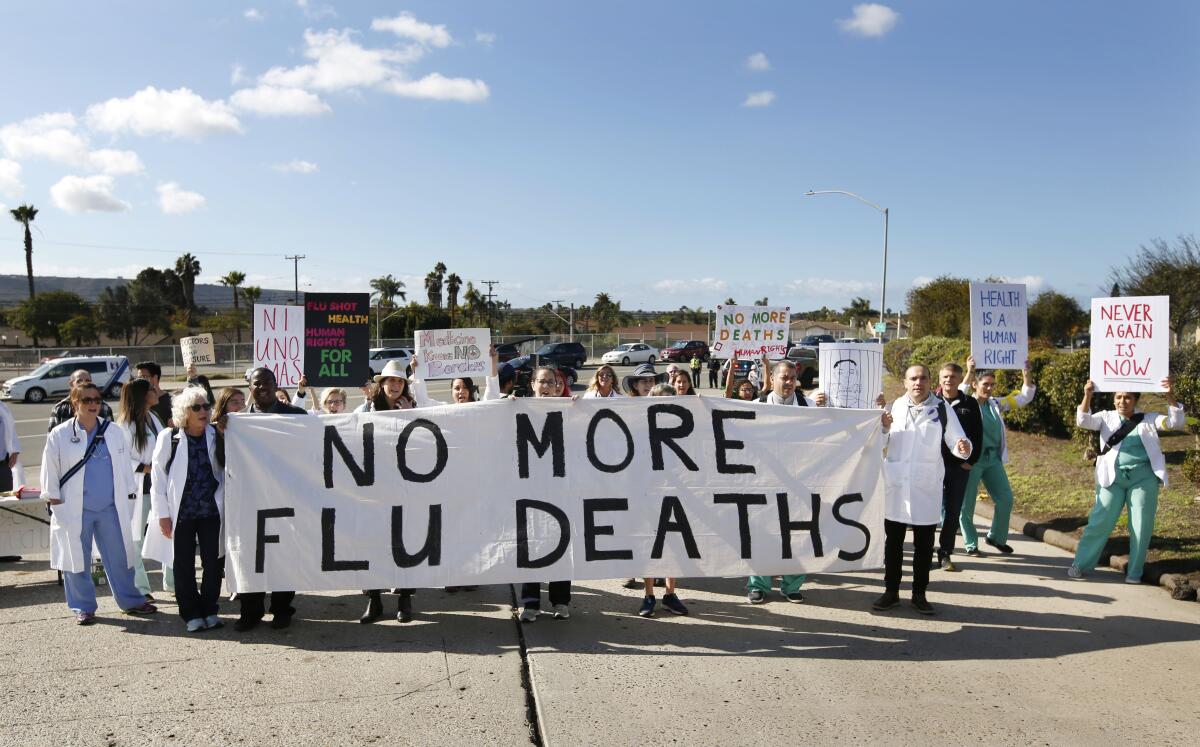When border officials brought in a detained child with flu, our hospital faced a dilemma

- Share via
Physicians have grown increasingly concerned in recent months about the state of health care in migrant detention facilities, particularly for children.
Earlier this month, the two of us had a firsthand look at one part of the problem.
One of us (Donna Woods) was on duty in the emergency room of the Tucson hospital where she practices when Customs and Border Protection brought in a child who had tested positive for influenza. CBP wanted the emergency department to clear the child to be returned to the detention facility.
The request presented a dilemma to the team working that day.
In clearing a flu-positive patient, a doctor isn’t simply saying there are no acute life-threatening signs at the time of exam; he or she is also deciding that it’s safe to return the patient to a particular location or situation. Clearance to return a child to poor conditions, without proper care and monitoring, could increase the possibility of complications from the flu. And, without proper patient isolation, others could be exposed to a serious illness.
In the last year, at least three migrant children have died in detention of flu-related causes, so the question of what kind of conditions the patient would be facing wasn’t simply academic.
When the hospital called the CBP facility from which the child was sent, the person who answered declined to answer questions about aerosol precautions and who would be monitoring the patient. Dona Kim Murphey, who has been deeply involved in trying to improve medical care for detained immigrants, called too. But she couldn’t get answers either.
The child, who seemed out of danger, was ultimately released back to the custody of CBP. But not without qualms. Hospital staff worried about the child, and we also worried that immigration officials have begun trying to pass the buck on responsibility for sick children by asking outside health professionals to clear sick detainees for continued incarceration.
What’s most frustrating is that situations like this one are often avoidable. Earlier this year, the Centers for Disease Control and Prevention recommended that migrants over the age of 6 months be given flu vaccinations “at the earliest point of entry.” But immigration officials have refused to do so.
This makes no sense, especially given the kind of severely overcrowded conditions in which many migrants are held. Such conditions create a perfect environment for the spread of communicable diseases. CBP has said it doesn’t keep people long enough to justify vaccinations, but in many detention centers, migrants are sometimes held for weeks, and some are then transferred to the custody of Immigration and Customs Enforcement and held in its facilities.
Across the country, in inspections conducted by a range of agencies, immigration detention centers have been found to have deficient healthcare. The 1997 settlement of a Los Angeles case challenging the treatment of migrant children in custody, known as the Flores agreement, requires that children be held in safe and sanitary conditions. But testimony taken over the years in connection with the settlement has consistently documented serious problems, including a lack of secure access to food, water, warmth, hygiene, and basic medical care.
There has been an escalation of physician concern in recent months regarding the inhumane conditions of immigration detention, and groups of medical professionals and advocates have been pushing to improve the situation. Eighteen months ago, Murphey was part of a group that attempted to deliver $10,000 worth of supplies and pro-bono medical services to Ursula Detention Center in McAllen, Texas, but the group was turned away. Earlier this month, at the border near San Diego, another group turned up at a CBP facility with donated flu vaccine and the medical personnel to administer it, but they, too, were refused, and some of the doctors were taken away in handcuffs.
It’s incomprehensible why immigration officials are resistant to improving care for people in their custody. We are lucky to both work in places supportive of compassionate action. We are determined to continue to provide the best possible care for all people, regardless of immigration status. And we will continue to push the federal government to do the same.
Donna Woods is an emergency medicine physician at Tucson Medical Center. Dona Kim Murphey is director of health initiatives for Project Lifeline.
More to Read
A cure for the common opinion
Get thought-provoking perspectives with our weekly newsletter.
You may occasionally receive promotional content from the Los Angeles Times.









